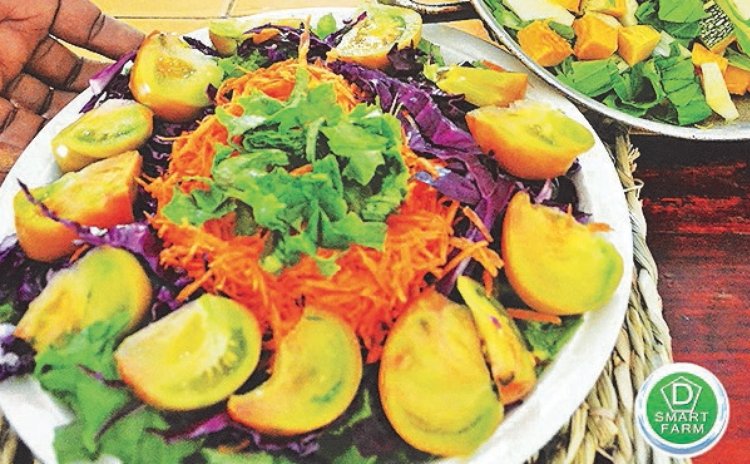The plant-based lifestyle

Fruits and vegetables are a must for those whose lifestyles are based on wellness and natural living.
In fact, some people eat them exclusively, either in their natural forms or as foods made from them.
Retired nurse and Seventh Day Adventist, Priscilla Prevost omitted meat from her diet nearly 35 years ago, but occasionally eats an egg.
Priscilla, an experienced weight management service provider/counselor, strongly recommends a plant-based diet.
From a religious standpoint, she said The Seventh Day Adventist Church believes that God gave man a plant-based diet in the beginning.
And from a medical perspective, Priscilla's says a plant-based diet can help prevent, manage and even reverse diseases.
"The benefits are many…You can get all the nutrients the body requires from plants," she said. "You are able to function effectively, your performance level is high.
"Your mental capacity -- your ability to concentrate, to make wise decisions --- [increases] because the blood vessels are not clogged with cholesterol.
"Coupled with exercise. . . your joints, your bones and ligaments are stronger. Your level of endurance is higher," she explained.
A plant-based diet can help to reduce the risk of cancer as well as manage or reverse diabetes, high blood pressure and high blood cholesterol.
Referring to diabetes, she said, "We are talking about reversal; and it's happening right here in Dominica!"
She explained that diabetes is more closely linked to an unhealthy lifestyle than to genetics. "So if you change your lifestyle, you are no longer diabetic," she declared.
The change comprises a low-fat, plant-based diet and an exercise plan, which includes 'digestive' walks taken 15-30 minutes after each meal.
"The way the body works, after you eat you want to sleep because there is a rush of energy to the abdomen to digest the meal.
"So the concentration is in the stomach area to help digest . . . but when you walk, it dissipates . . . and helps to release glucose more slowly into the bloodstream.
"So you don't have this rush of sugar, which calls for insulin to get into the cells….so there is a normalizing effect," Priscilla said.
Research shows that some fruits and vegetables have anti-cancer properties while many contain antioxidants that can protect against cancer.
Priscilla pointed out that persons who adopt a plant-based diet must ensure that the foods they eat satisfy their bodies' daily nutrition requirements.
These are proteins, carbohydrates, fats, vitamins, minerals and water. Additionally, the body requires antioxidants and phytochemicals found in plant foods, she said.
Carbohydrates should provide 55-65 percent of daily caloric needs -- ideally from complex carbohydrates like brown rice, oats and whole-wheat products.
Protein should provide 12-15 percent of total daily energy requirements, which requires 45-70 grams of protein.
One cup of soy milk contains about six grams of protein while a slice of whole wheat bread contains about four grams.
Beans, seeds, nuts and mushrooms are also good sources of protein. Half a cup of cooked beans contains about eight grams of protein.
Look for a milk with a minimum of six grams of protein per serving, Priscilla advises.
Further, experts recommend that 25 percent of one's daily caloric intake should come from fats, preferably plant fats.
Touching on micro-nutrients, Priscilla said minerals such as iron, calcium, phosphorous, sodium and potassium are available in cereals, vegetables and milk.
Hypertension can be prevented when there is a good balance between sodium and potassium.
Blood pressure levels can spike if sodium levels are high, but can be reduced by eating potassium-rich fruits and vegetables, which can decrease blood pressure.
Fruits and vegetables are also great sources of vitamins. She said vitamin C is an antioxidant, which helps to prevent disease.
Animal products are rich in Vitamin B12, but plant-based foods can be fortified with it. One cup of soy milk has 45 percent of the daily requirement of B12.
B12 can also be obtained through supplements.
Also, when there is a good mix of whole grains and vegetables, a person eating only plant-based foods is assured of all the amino acids the body requires.
Priscilla warns against buying vitamin and mineral supplements with 600 percent or 1000 percent of the Recommended Daily Allowance (RDA).
"It means you are taking 500 - 900 percent more than what is recommended for your body for a day and that can have consequences. Instead, reach for a supplement with a maximum RDA of 100 percent," she said.
Priscilla stressed the value of drinking water, noting that the recommendation is for persons to drink half their bodyweight in ounces of water.
So a person weighing 150 pounds should drink 75 ounces of water per day; ideally, between meals.
She advised that a plant-sourced diet should be properly planned with consideration for balance, creativity and taste.




